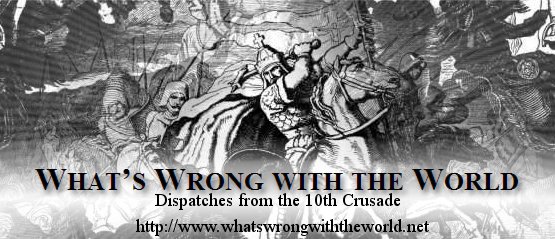You will never understand JPII if you try to analyze him in political categories.I was on a Mark Shea kick for a while there, then I got off onto, well, I don't remember, but another kick is what I'm betting.
Look. Here's the deal: People continue to be let down by JPII because he doesn't do what they'd do about our crop of bishops: Fire Them All!!! I submit that's basically because they keep thinking that JPII thinks like them, so why doesn't he arrive at their conclusions?
JPII doesn't think like us. Here are some of his fundamental ideas: [...]
Now, it is customary at this point to whine about our helplessness and lack of access to the bureaucratic machinery that elects bishops and assigns priests--as if that's the sole or even the most important form of power wielded in the Church. This is, however, to think politically--precisely the terms in which JPII does not think. And the reason he doesn't think in those terms is because he's right: culture, not politics is much more determinative of how the Church lives. Don't believe that? Then explain how, if the laity are so powerless, a parish like St. Joan's can basically push a bishop like Abp. Flynn around and blow him off? If bishops hold all the cards and laypeople can only cringe and scrape before their almighty outstretched hand, then why do places like Seattle U tell Abp. Brunett to blow it out his ear and go ahead and invite the Jesus Seminar in anyway?
This may be one of the most insightful pieces I've read on this. Someone should forward it to Andrew Sullivan. Not that he'd listen, but still.
On the other hand, the always estimable Paul Jaminet (the Brother by the Other Mother, if memory serves) has this:
This is true; but the Vatican should be looking at two things. First, the selection process for bishops is failing if 60% of those promoted to bishop are unwilling to do the job faithfully. Second, Judeo-Christian morals teach not only that decision-makers should resist temptation, but that others should strive to remove temptation from them. (Indeed, Jesus taught us to pray, "Lead us not into temptation," not, "Help us resist temptation.") The structure of the Church gives sole power to bishops, without checks or balances from other authorities and without sharing information with anyone. This structure made sense in the Middle Ages when it was extremely costly to travel more than a few miles and involve others in decision-making; but it tempts bishops to conceal embarrassing acts. It is long past time for canon law to introduce greater information-sharing, review of episcopal actions, and checks upon episcopal authority. The bishops would still retain their apostolic authority to lead, preach, and sanctify; but they would be less likely to sin.I find Shea more compelling, except to note that Jaminet is right: The selection process, or perhaps the culture into which the selected arrive, is badly flawed.
That's all the typing I can manage for now. Back soon.

No comments:
Post a Comment